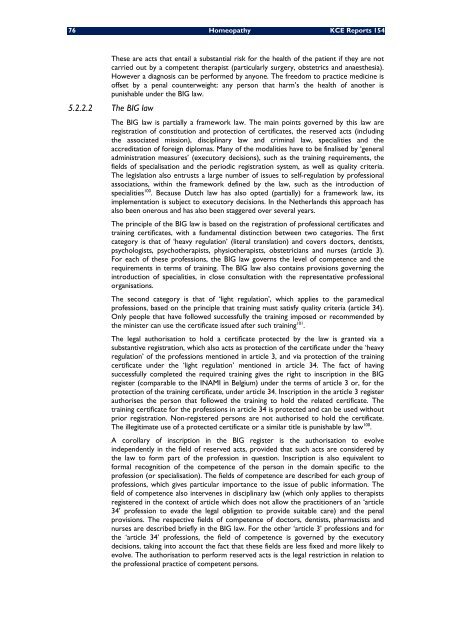Etat des lieux de l'homéopathie en Belgique - KCE
Etat des lieux de l'homéopathie en Belgique - KCE
Etat des lieux de l'homéopathie en Belgique - KCE
Create successful ePaper yourself
Turn your PDF publications into a flip-book with our unique Google optimized e-Paper software.
76 Homeopathy <strong>KCE</strong> Reports 154<br />
These are acts that <strong>en</strong>tail a substantial risk for the health of the pati<strong>en</strong>t if they are not<br />
carried out by a compet<strong>en</strong>t therapist (particularly surgery, obstetrics and anaesthesia).<br />
However a diagnosis can be performed by anyone. The freedom to practice medicine is<br />
offset by a p<strong>en</strong>al counterweight: any person that harm’s the health of another is<br />
punishable un<strong>de</strong>r the BIG law.<br />
5.2.2.2 The BIG law<br />
The BIG law is partially a framework law. The main points governed by this law are<br />
registration of constitution and protection of certificates, the reserved acts (including<br />
the associated mission), disciplinary law and criminal law, specialities and the<br />
accreditation of foreign diplomas. Many of the modalities have to be finalised by ‘g<strong>en</strong>eral<br />
administration measures’ (executory <strong>de</strong>cisions), such as the training requirem<strong>en</strong>ts, the<br />
fields of specialisation and the periodic registration system, as well as quality criteria.<br />
The legislation also <strong>en</strong>trusts a large number of issues to self-regulation by professional<br />
associations, within the framework <strong>de</strong>fined by the law, such as the introduction of<br />
specialities 100 . Because Dutch law has also opted (partially) for a framework law, its<br />
implem<strong>en</strong>tation is subject to executory <strong>de</strong>cisions. In the Netherlands this approach has<br />
also be<strong>en</strong> onerous and has also be<strong>en</strong> staggered over several years.<br />
The principle of the BIG law is based on the registration of professional certificates and<br />
training certificates, with a fundam<strong>en</strong>tal distinction betwe<strong>en</strong> two categories. The first<br />
category is that of ‘heavy regulation’ (literal translation) and covers doctors, <strong>de</strong>ntists,<br />
psychologists, psychotherapists, physiotherapists, obstetricians and nurses (article 3).<br />
For each of these professions, the BIG law governs the level of compet<strong>en</strong>ce and the<br />
requirem<strong>en</strong>ts in terms of training. The BIG law also contains provisions governing the<br />
introduction of specialities, in close consultation with the repres<strong>en</strong>tative professional<br />
organisations.<br />
The second category is that of ‘light regulation’, which applies to the paramedical<br />
professions, based on the principle that training must satisfy quality criteria (article 34).<br />
Only people that have followed successfully the training imposed or recomm<strong>en</strong><strong>de</strong>d by<br />
the minister can use the certificate issued after such training 101 .<br />
The legal authorisation to hold a certificate protected by the law is granted via a<br />
substantive registration, which also acts as protection of the certificate un<strong>de</strong>r the ‘heavy<br />
regulation’ of the professions m<strong>en</strong>tioned in article 3, and via protection of the training<br />
certificate un<strong>de</strong>r the ‘light regulation’ m<strong>en</strong>tioned in article 34. The fact of having<br />
successfully completed the required training gives the right to inscription in the BIG<br />
register (comparable to the INAMI in Belgium) un<strong>de</strong>r the terms of article 3 or, for the<br />
protection of the training certificate, un<strong>de</strong>r article 34. Inscription in the article 3 register<br />
authorises the person that followed the training to hold the related certificate. The<br />
training certificate for the professions in article 34 is protected and can be used without<br />
prior registration. Non-registered persons are not authorised to hold the certificate.<br />
The illegitimate use of a protected certificate or a similar title is punishable by law 100 .<br />
A corollary of inscription in the BIG register is the authorisation to evolve<br />
in<strong>de</strong>p<strong>en</strong><strong>de</strong>ntly in the field of reserved acts, provi<strong>de</strong>d that such acts are consi<strong>de</strong>red by<br />
the law to form part of the profession in question. Inscription is also equival<strong>en</strong>t to<br />
formal recognition of the compet<strong>en</strong>ce of the person in the domain specific to the<br />
profession (or specialisation). The fields of compet<strong>en</strong>ce are <strong><strong>de</strong>s</strong>cribed for each group of<br />
professions, which gives particular importance to the issue of public information. The<br />
field of compet<strong>en</strong>ce also interv<strong>en</strong>es in disciplinary law (which only applies to therapists<br />
registered in the context of article which does not allow the practitioners of an ‘article<br />
34’ profession to eva<strong>de</strong> the legal obligation to provi<strong>de</strong> suitable care) and the p<strong>en</strong>al<br />
provisions. The respective fields of compet<strong>en</strong>ce of doctors, <strong>de</strong>ntists, pharmacists and<br />
nurses are <strong><strong>de</strong>s</strong>cribed briefly in the BIG law. For the other ‘article 3’ professions and for<br />
the ‘article 34’ professions, the field of compet<strong>en</strong>ce is governed by the executory<br />
<strong>de</strong>cisions, taking into account the fact that these fields are less fixed and more likely to<br />
evolve. The authorisation to perform reserved acts is the legal restriction in relation to<br />
the professional practice of compet<strong>en</strong>t persons.

















